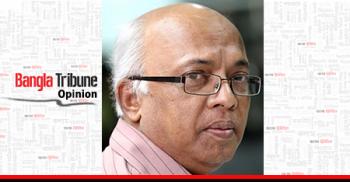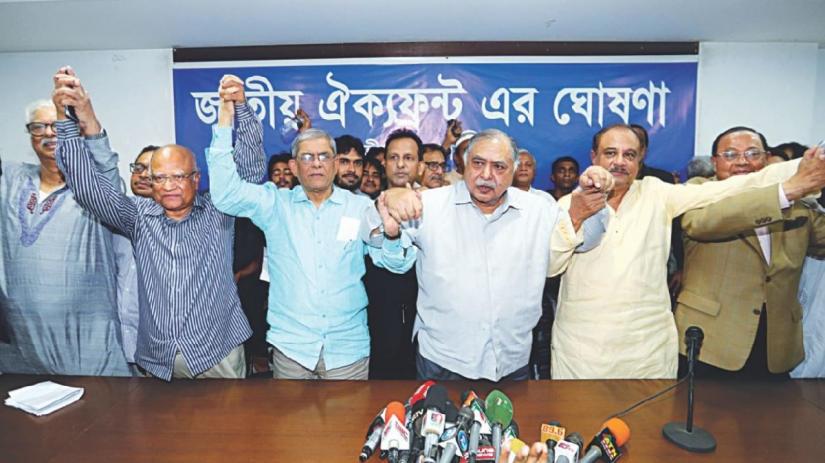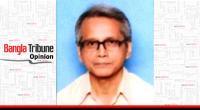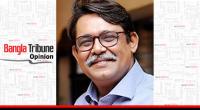 ASM Abdur Rab did not answer the question Nazrul Kabir put to him on Ekattor Television the other day. Instead, he tried browbeating the reputed journalist, which Kabir surely is, into silence. His rudeness was a reminder of the many ways in which he spoke in disparaging terms about Bangabandhu Sheikh Mujibur Rahman in the early 1970s when the Father of the Nation governed this land. It also brought back to us memories of how, in the Ershad era, he told an interviewer, in response to a question of whether he considered Bangladesh’s founder as the Father of the Nation, that it was not necessary for a nation to have a father or uncle or mother. He was being dismissive of Bangabandhu, the man in whose tutelage he rose to the heights of politics. But rudeness gave way to tentative respect when, as a minister in Sheikh Hasina’s first government, he waxed eloquent about the historic role Sheikh Mujibur Rahman had played in the creation of Bangladesh. His speeches in those ministerial days carefully noted that Bangabandhu was, well, Bangabandhu.
ASM Abdur Rab did not answer the question Nazrul Kabir put to him on Ekattor Television the other day. Instead, he tried browbeating the reputed journalist, which Kabir surely is, into silence. His rudeness was a reminder of the many ways in which he spoke in disparaging terms about Bangabandhu Sheikh Mujibur Rahman in the early 1970s when the Father of the Nation governed this land. It also brought back to us memories of how, in the Ershad era, he told an interviewer, in response to a question of whether he considered Bangladesh’s founder as the Father of the Nation, that it was not necessary for a nation to have a father or uncle or mother. He was being dismissive of Bangabandhu, the man in whose tutelage he rose to the heights of politics. But rudeness gave way to tentative respect when, as a minister in Sheikh Hasina’s first government, he waxed eloquent about the historic role Sheikh Mujibur Rahman had played in the creation of Bangladesh. His speeches in those ministerial days carefully noted that Bangabandhu was, well, Bangabandhu.
It is now back to square one for Rab. In the Jatiya Oikya Front, he is not the only politician who gives us a reason for worry. All citizens respect Begum Khaleda Zia, though not all of them are ready to back her over the way she has conducted politics in Bangladesh. That is understandable. But observe how Mahmudur Rahman Manna went over the top a few days ago when he proclaimed his intention of sacrificing his life, if need be, for the former prime minister. It was a flippant statement and a man of Manna’s background ought not to have made it. He could have demanded Begum Zia’s release; he could have stated plainly that elections would not be fair with her locked away. But to give up his life in order to save her? That was a bit too rich, even from a politician groomed in the emotion-driven landscape of Bangladesh.
Rab’s rudeness and Manna’s effusive defence of the BNP chairperson are not the only problems with the Jatiya Oikya Front. The Front is certainly an alliance of individuals and parties offering a political alternative to the country, but what does worry citizens, those who have not forgotten the past, is the baggage some of its leading lights happen to be carrying. One of them was happily associated with Khondokar Moshtaq’s Democratic League in the aftermath of Bangabandhu’s assassination and the murder of the four national leaders in prison. How do you respond when such individuals, linked to the man who headed the conspiracy against a legally established government and who to all intents and purposes gave the green signal for the murder of the nation’s pre-eminent independence leaders, today defend democracy in vociferous fashion?
And, of course, Dr. Kamal Hossain, without question the star figure around whom the Oikya Front is in orbit, will have a hard time explaining the remarks he made back in 1981 about the BNP’s polls symbol of dhaaner sheesh — or sheaf of paddy — condemning it as a symbol of decadence, of everything going wrong in the country. It was the day when he lost the presidential election to Justice Abdus Sattar. Ironically, Dr. Hossain today is the leading standard bearer of politics exemplified by the sheaf of paddy. That begs the question: is the BNP part of the Jatiya Oikya Front or is the Jatiya Oikya Front part of the BNP? It was the public expectation, once the Front was cobbled into shape, that a credible election symbol, one that would be at variance with the sheaf of paddy, would speak for the Oikya Front in the run-up to the elections. And here is the truth: the Oikya Front is a vehicle where the BNP occupies the driver’s seat, a position it may not have had if it had to contest the elections on its own. That explains the sheaf of paddy. Let that be. We now must chastise the individual who, in clear ignorance of history, attempted to place Kamal Hossain at par with Bangabandhu. It was one of those careless statements which certainly must have embarrassed the man who served the Father of the Nation as constitutional advisor, law minister and foreign minister. Dr. Kamal Hossain’s place in history is assured; the respect people have for him is undeniable. But stretching the historical narrative to place him on a level with Bangladesh’s founding father is untenable. It is unfortunate that some men, carried away by misplaced emotion, end up embarrassing not only themselves but also those they seek to praise for their human qualities.
Let that be. We now must chastise the individual who, in clear ignorance of history, attempted to place Kamal Hossain at par with Bangabandhu. It was one of those careless statements which certainly must have embarrassed the man who served the Father of the Nation as constitutional advisor, law minister and foreign minister. Dr. Kamal Hossain’s place in history is assured; the respect people have for him is undeniable. But stretching the historical narrative to place him on a level with Bangladesh’s founding father is untenable. It is unfortunate that some men, carried away by misplaced emotion, end up embarrassing not only themselves but also those they seek to praise for their human qualities.
And here is our final point.
At the inauguration of the Jatiya Oikya Front, Dr. Kamal Hossain made references to Bangabandhu and his ideals a number of times. But the Front has yet to enlighten the country on whether the BNP made its way into the Front through abjuring its misleading past interpretations of history. The party has been in denial about the background to the War of Liberation; it has consistently tried airbrushing Bangabandhu and the Mujibnagar leaders out of history; it has promoted ‘Bangladeshi nationalism’ through pushing the Bengali heritage of the nation aside. Has the BNP agreed to a turnaround, to an acknowledgement of history as we saw it unfold in the early 1970s? We have not had any answer to that question so far.
Elections are good, obviously necessary. But so are integrity and a sense of the past in those who aspire to high political office.
Syed Badrul Ahsan is Editor-in-Charge, The Asian Age


